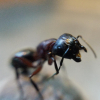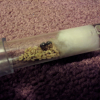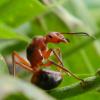- Formiculture.com
- Forums
- Gallery
- Members
- Member Map
- Chat

Odds of an ant making it to adulthood?
Started By
Canadant
, Aug 8 2019 2:40 PM
5 replies to this topic
#1
 Offline
-
Posted August 8 2019 - 2:40 PM
Offline
-
Posted August 8 2019 - 2:40 PM
I guess for the sake of interest, what are the odds of an ant making it through life to die of old age? I'm sure species matter but there's got to be general ballpark. Heck if you know the stat of one species the would be cool.
I guess I'm thinking about the oceans and how creatures spawn in huge masses in hopes that just one will make it. Be it coral, sea turtles, crabs etc. I know the odds for these creatures is shockingly low. So I wonder about ants.
Yesterday I filmed lasius ants spilling out of their nest in a nup. I knew in an hour or two there would be wingless queens all over the ground. And yup sure enough, I mean all over the ground wingless and searching. It just got me thinking.
I searched Google but it's all about life cycle but no 'odds on life and it's awful outcomes,
sometimes'.
And I do suppose that by raising ants it gives one queen or colony a little help from a mini angel and that's got to be a good thing. I mean that's the purpose of life.
Sincerely
Candant
I guess I'm thinking about the oceans and how creatures spawn in huge masses in hopes that just one will make it. Be it coral, sea turtles, crabs etc. I know the odds for these creatures is shockingly low. So I wonder about ants.
Yesterday I filmed lasius ants spilling out of their nest in a nup. I knew in an hour or two there would be wingless queens all over the ground. And yup sure enough, I mean all over the ground wingless and searching. It just got me thinking.
I searched Google but it's all about life cycle but no 'odds on life and it's awful outcomes,
sometimes'.
And I do suppose that by raising ants it gives one queen or colony a little help from a mini angel and that's got to be a good thing. I mean that's the purpose of life.
Sincerely
Candant
"You don't get what you want. You get what you deserve".
#2
 Offline
-
Posted August 8 2019 - 4:18 PM
Offline
-
Posted August 8 2019 - 4:18 PM
ik in the wild prenolepis imparis have like a 96% mortality rate i think its actually higher but I'm not sure but theese ants arent built well to survive
#3
 Offline
-
Posted August 8 2019 - 4:36 PM
Offline
-
Posted August 8 2019 - 4:36 PM
Just an assumption but the ones in our formicariums would be significantly lower since we would be the ultimate deciding factor besides genetics. It's interesting though, some of the most experienced keepers here have ants that just die
Sent from my LM-G710 using Tapatalk
Sent from my LM-G710 using Tapatalk
Ant Journal: http://www.formicult...-journal/<br> My colonies: C. Semitestaceus, P. Californicus, V. Pergandei, S. Xyloni.
#4
 Offline
-
Posted August 8 2019 - 5:36 PM
Offline
-
Posted August 8 2019 - 5:36 PM
Just an assumption but the ones in our formicariums would be significantly lower since we would be the ultimate deciding factor besides genetics. It's interesting though, some of the most experienced keepers here have ants that just die
Sent from my LM-G710 using Tapatalk
Nearly all my ants do that at some point. I had a camponotus queen with ten workers just decide it was the perfect time to have a seizure and die. ![]()
#5
 Offline
-
Posted August 8 2019 - 10:26 PM
Offline
-
Posted August 8 2019 - 10:26 PM
#6
 Offline
-
Posted August 9 2019 - 3:13 AM
Offline
-
Posted August 9 2019 - 3:13 AM
I was also wondering how effective being a parasite is? I tried 3 times with a lasius subumbratus ant. I came close but failed. That's got to be a risky form of creating a nest and offspring. I can't imagine covering myself in pheromones and heading into a nest alone to kill the queen and take over. That's top level stuff. Its success rate can't be that great or I would see way more subumbratus in that particular area. Unless I'm wrong. Perhaps it's very effective.
Canadant
Canadant
"You don't get what you want. You get what you deserve".
1 user(s) are reading this topic
0 members, 1 guests, 0 anonymous users


















